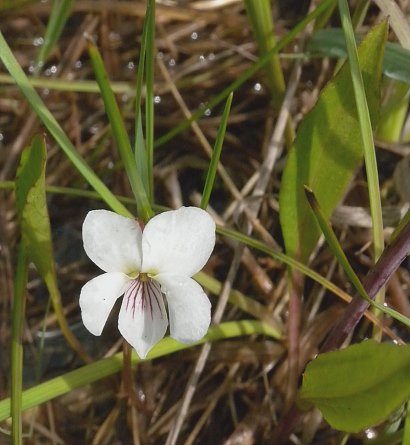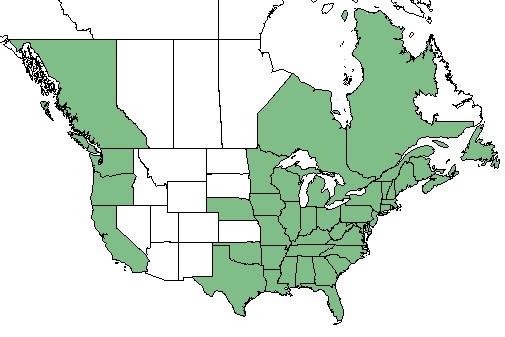Difference between revisions of "Viola lanceolata"
(→Description) |
|||
| Line 35: | Line 35: | ||
In the southeastern and mid-Atlantic United States, flowering occurs from February through May.<ref name="Weakley 2015"/> On the Florida panhandle, flowering has been observed from November through May, peaking in March and April.<ref name="PanFlora">Nelson G (05 February 2018) PanFlora. Retrieved from gilnelson.com/PanFlora/</ref> | In the southeastern and mid-Atlantic United States, flowering occurs from February through May.<ref name="Weakley 2015"/> On the Florida panhandle, flowering has been observed from November through May, peaking in March and April.<ref name="PanFlora">Nelson G (05 February 2018) PanFlora. Retrieved from gilnelson.com/PanFlora/</ref> | ||
<!--===Seed dispersal===--> | <!--===Seed dispersal===--> | ||
| − | + | ||
| + | ===Seed bank and germination=== | ||
| + | At an Ontario lake, the frequency of ''V. lanceolata'' was 97 at 0.2-0.8 m below the maximum water level and 100 and 13 at 0.8-1.3 m and 1.3-1.5 m, respectively. The mean number of collected seeds that germinated from this lake was 17.4 seeds dm<sup>-2</sup>.<ref name="Keddy & Reznicek 1982">Keddy PA, Reznicek AA (1982) The role of seed banks in the persistence of Ontario's coastal plain flora. American Journal of Botany 69(1):13-22.</ref> | ||
| + | |||
<!--===Fire ecology===--> <!--Fire tolerance, fire dependence, adaptive fire responses--> | <!--===Fire ecology===--> <!--Fire tolerance, fire dependence, adaptive fire responses--> | ||
<!--===Pollination===--> | <!--===Pollination===--> | ||
Revision as of 16:50, 5 February 2018
| Viola lanceolata | |
|---|---|

| |
| Photo by John Hilty hosted at IllinoisWildflowers.info | |
| Scientific classification | |
| Kingdom: | Plantae |
| Division: | Magnoliophyta - Flowering plants |
| Class: | Magnoliopsida - Dicots |
| Order: | Violales |
| Family: | Violaceae |
| Genus: | Viola |
| Species: | V. lanceolata |
| Binomial name | |
| Viola lanceolata L. | |

| |
| Natural range of Viola lanceolata from USDA NRCS Plants Database. | |
Common Names: lanceleaf violet; narrow-leaved violet;strap-leaved violet;[1] bog white violet[2]
Contents
Taxonomic Notes
Varieties: V. lanceolata var. lanceolata; V. lanceolata var. vittata[1]
Subspecies: V. lanceolata ssp. lanceolata; V. lanceolata ssp. vittata; V. lanceolata ssp. occidentalis[2]
Description
Viola lanceolata is a dioecious perennial forb/herb.[2]
Distribution
This species occurs from New Brunswick, westward to Minnesota, and southward to Florida and eastern Texas.[1]There have also been reports along the Pacific coast in British Columbia, Washington, Oregon, and California.[2]
Ecology
Habitat
V. lanceolata is found in boggs, seepage slopes, pitcher plant seepage bogs, streamheads and their margins, small swamp forests, depression ponds, interdune swales and ponds, and other wet habitats.[1]
Phenology
In the southeastern and mid-Atlantic United States, flowering occurs from February through May.[1] On the Florida panhandle, flowering has been observed from November through May, peaking in March and April.[3]
Seed bank and germination
At an Ontario lake, the frequency of V. lanceolata was 97 at 0.2-0.8 m below the maximum water level and 100 and 13 at 0.8-1.3 m and 1.3-1.5 m, respectively. The mean number of collected seeds that germinated from this lake was 17.4 seeds dm-2.[4]
Conservation and Management
Cultivation and restoration
Photo Gallery
References and notes
- ↑ 1.0 1.1 1.2 1.3 1.4 Weakley AS (2015) Flora of the Southern and Mid-Atlantic States. Chapel Hill, NC: University of North Carolina Herbarium.
- ↑ 2.0 2.1 2.2 2.3 USDA NRCS (2016) The PLANTS Database (http://plants.usda.gov, 05 February 2018). National Plant Data Team, Greensboro, NC 27401-4901 USA.
- ↑ Nelson G (05 February 2018) PanFlora. Retrieved from gilnelson.com/PanFlora/
- ↑ Keddy PA, Reznicek AA (1982) The role of seed banks in the persistence of Ontario's coastal plain flora. American Journal of Botany 69(1):13-22.